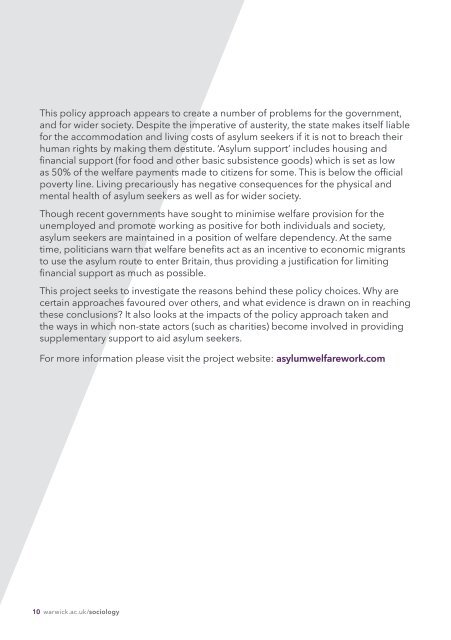Warwick Socio BrumBrexit
PDF version of the briefing paper made to accompany event "Understanding Brexit: Inequality, Inclusion and Social Justice" held at the Impact Hub, 26th January, 2017. Organised by Professor Gurminder K Bhambra for University of Warwick | Department of Sociology
PDF version of the briefing paper made to accompany event "Understanding Brexit: Inequality, Inclusion and Social Justice" held at the Impact Hub, 26th January, 2017. Organised by Professor Gurminder K Bhambra for
University of Warwick | Department of Sociology
You also want an ePaper? Increase the reach of your titles
YUMPU automatically turns print PDFs into web optimized ePapers that Google loves.
This policy approach appears to create a number of problems for the government,<br />
and for wider society. Despite the imperative of austerity, the state makes itself liable<br />
for the accommodation and living costs of asylum seekers if it is not to breach their<br />
human rights by making them destitute. ‘Asylum support’ includes housing and<br />
financial support (for food and other basic subsistence goods) which is set as low<br />
as 50% of the welfare payments made to citizens for some. This is below the official<br />
poverty line. Living precariously has negative consequences for the physical and<br />
mental health of asylum seekers as well as for wider society.<br />
Though recent governments have sought to minimise welfare provision for the<br />
unemployed and promote working as positive for both individuals and society,<br />
asylum seekers are maintained in a position of welfare dependency. At the same<br />
time, politicians warn that welfare benefits act as an incentive to economic migrants<br />
to use the asylum route to enter Britain, thus providing a justification for limiting<br />
financial support as much as possible.<br />
This project seeks to investigate the reasons behind these policy choices. Why are<br />
certain approaches favoured over others, and what evidence is drawn on in reaching<br />
these conclusions? It also looks at the impacts of the policy approach taken and<br />
the ways in which non-state actors (such as charities) become involved in providing<br />
supplementary support to aid asylum seekers.<br />
For more information please visit the project website: asylumwelfarework.com<br />
Prof. Steve Fuller<br />
Professor | Department of <strong>Socio</strong>logy | S.W.Fuller@warwick.ac.uk<br />
Since the 23 June 2016 referendum that voted to take the UK out of the European<br />
Union, Fuller has published the following posts which can be found collected here<br />
on his <strong>Warwick</strong> webpage here:<br />
http://tinyurl.com/z2zdowc<br />
The articles draw on social and political theory to explain the outcome along<br />
several dimensions, including the role of elites, expertise, political discourse,<br />
cosmopolitanism, intergenerational conflict, political timing and populism.<br />
In his piece for University World News (07 October 2016 Issue No:431) Fuller<br />
discusses the implications of the striking “anti-expert” rhetoric that surrounded the<br />
referendum for academics and universities, using a comparison with the ‘think for<br />
yourself’ trends of the Protestant Reformation and Enlightened University pioneer<br />
Wilhelm von Humboldt. Rather than necessarily a cause for pessimism for producers<br />
of academic knowledge, Brexit’s rejection of ‘expertise’ could constitute a rallying<br />
call for academic leaders to return the Humboldtian value of “openness of inquiry”<br />
and the training of “citizens with the wherewithal to be active participants in the<br />
governance and enrichment of their society” (Fuller, 2016).<br />
Fuller also made two videos (available on his YouTube channel: Prof. Steve Fuller)<br />
explaining Brexit:<br />
They are entitled “What is Brexit?” and “Aftermath of the EU Referendum”<br />
https://www.youtube.com/channel/UC1WGCvbISDr5-t0ZeYw9tHQ<br />
10 warwick.ac.uk/sociology warwick.ac.uk/sociology 11


